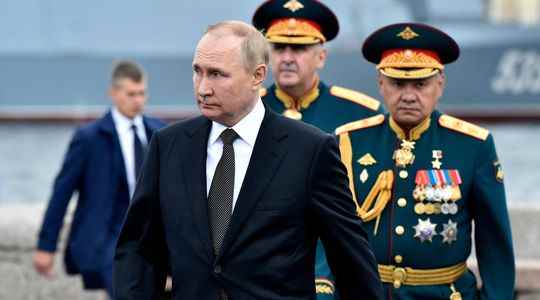What is Moscow playing? The question torments Western chancelleries after a series of phone calls made on Sunday, October 23 by the Russian Minister of Defense to his French, Turkish, British and American counterparts. During these exchanges – unprecedented in their scope since the beginning of the conflict – Sergei Shoigu expressed “his concerns about possible provocations by Ukraine with the use of a dirty bomb”. Accusations, qualified in the wake of “absurd” and “dangerous” by kyiv, which question the real intentions of the Kremlin.
“Traditionally, when the Russians accuse Ukraine of preparing an action, it is in reality to camouflage the fact that they themselves are preparing to carry it out”, underlines General Dominique Trinquand, military expert and former chief of the French mission to the UN. A point on which Westerners jointly warned on Monday. “No one would be fooled by an attempt to use this allegation as a pretext for escalation,” reacted in a joint statement the foreign ministers of France, the United Kingdom and the United States. Their fear? That Moscow is preparing a “false flag” attack intended to justify an escalation, potentially nuclear, in retaliation.
“We cannot exclude that it is a decoy”
The “dirty bomb”, also called radiological bomb, is a bomb combining conventional explosives and radioactive materials. “Its explosion does not have the power of a nuclear bomb, but it remains formidable insofar as it will disperse radioactive substances and contaminate the entire surrounding area”, explains General Trinquand.
Far from backtracking despite Western warnings, Moscow insisted all the more on Monday by saying that Ukraine had entered “in the final phase” of the manufacture of its “dirty bomb”. “The purpose of this provocation is to accuse Russia of using weapons of mass destruction in Ukraine and thus to launch a powerful anti-Russian campaign in the world”, added in a press release Lieutenant-General Igor Kirillov, in charge of the within the Russian army of radioactive substances, chemical and biological products.
Should this be seen as a pretext for a possible Russian nuclear escalation? “The tactical interest of using nuclear weapons in Ukraine remains very limited compared to the risks involved, considers General Trinquand. Russia could alienate its last supporters on the international scene, such as China or the India, but also expose itself to an extremely strong response from the West, led by the Americans. We cannot therefore exclude that it is a lure by Russia to divert attention from the debacle of its army in Herson.”
Difficulties of the Russian army
Having already been forced to withdraw from the Kharkiv region in September after a dazzling Ukrainian counter-offensive, Russian troops are indeed in great difficulty in the Kherson oblast in southern Ukraine. On Saturday, the pro-Russian authorities of this region annexed by Russia called on civilians to leave the regional capital “immediately” in the face of the advance of Ukrainian forces, while kyiv on Monday claimed the resumption of 90 localities in the region.
“Russian Defense Minister Sergei Shoigu probably sought to slow down or suspend Western military aid to Ukraine and weaken the NATO alliance during these alarmist calls,” notes in a report the Institute for the Study of War, a Washington-based think tank. These fanciful accusations from Moscow are in any case not the first. Last April, Lieutenant General Igor Kirillov had already accused the United States of preparing “provocations aimed at accusing the Russian armed forces of using chemical, biological or tactical nuclear weapons”. Two months earlier, even before the start of the Russian invasion, Vladimir Putin had accused Ukraine of seeking to “develop its own nuclear weapons”…
